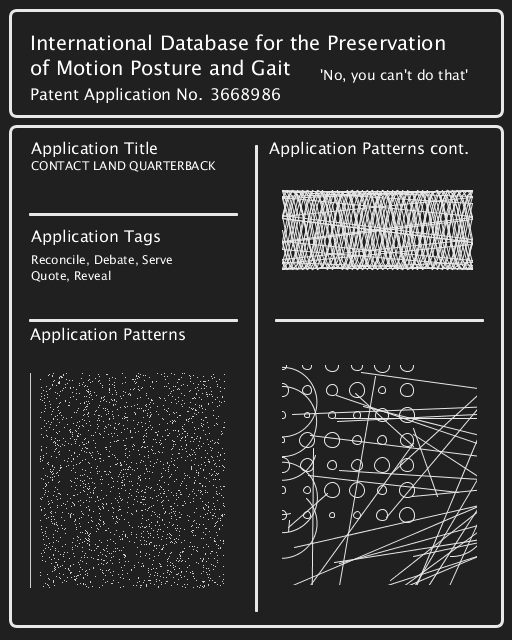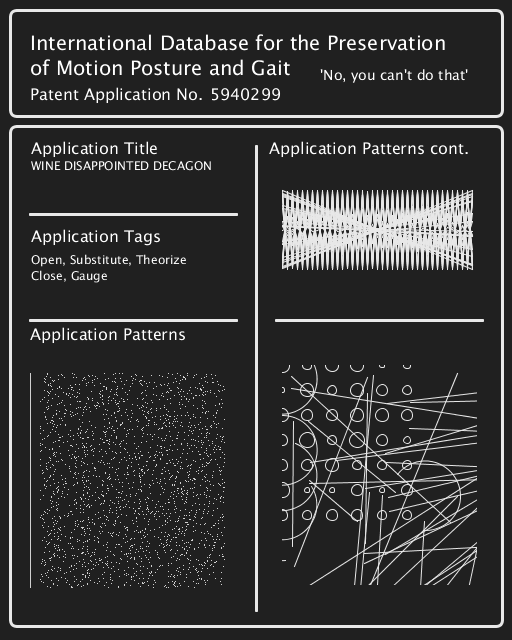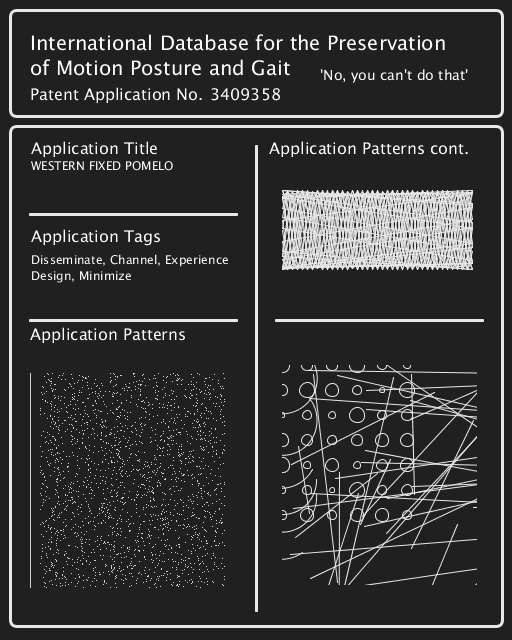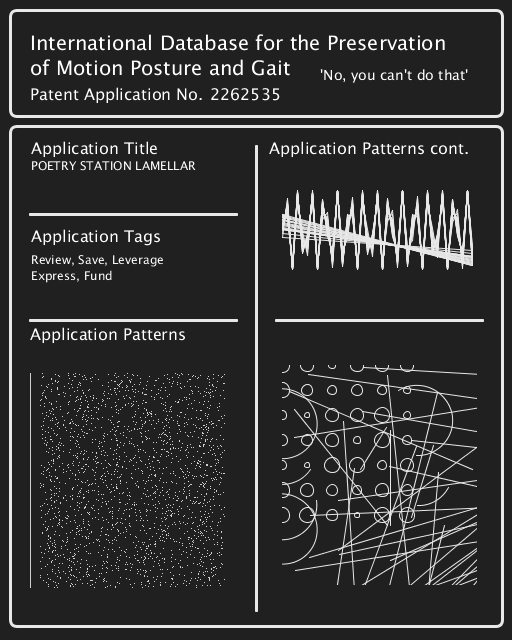The International Database for the Preservation of Movement, Posture and Gait
Our world is increasingly subject to surveillance and datafication. This research artefact chronicles an agency, business or god, which exercises total control over the movements of humans. Through extensive hacking and modification most electronic devices are now hooked into a global positioning system, sort of like GPS of old but more similar to a highly adept spotter in a game of musical statues.
Participants, i.e. everyone, must conform to strict usage rules with regard to movement. In order to access certain movements like, brushing your teeth, putting on socks or hugging a loved one, a small nominal fee is required. Patent laws have now expanded to encompass all of corporeal reality, meaning authors and creators will always be paid for their content creation. All hail the all seeing eyes and wave emissions of our functionally dystopic world.

Buzzing somewhere along the line between total annihilation and total abundance we find the Institute for the Preservation of Motion, Posture and Gait. The total rendering of reality into information is taken from security practices developed by the United States and allies following 9/11, with precedents dating back through the Cold War.
We must imagine the worst of all worlds.
The Institute for the Preservation of Motion, Posture and Gait engages with the theoretical work of Michel Foucault, Giorgio Agamben, and Gilles Deleuze. These authors examined modes of power and forms of societies correlated with them. I have applied their theoretical framework to a speculative future society where micro-transactions are required for humans to move.
We live in a time of self-determination, self-organisation and self-responsibility. In order to prevent our selves tipping into chaos we have limits. My work locates sovereignty as a contended space. In the Institute’s world, all space is contended, there are no infinite gaps, all is discrete. It is these limits that I try to approach in this work.
Foucault’s concepts of biopower and biopolitics ascribe human life into metrics and as things which are nurtured and fostered by authority. An authority can be a government, a government is not necessarily a state but a system for organising, overseeing and enforcing. Government by the market is implied in my piece, the name Institute is therefore a hint at obfuscation used by entities to gain authority.
- Governmentality as the way of producing/maintaining a citizen best suited to fulfilling government policy.
- Biopower as a sub-section of governmentality aimed directly at the human subject/citizen.
Deleuze’s Postscript on Societies of Control imagines a world filled with borders, one’s which are individually tailored to permit or deny access. Also important in this vein are the writings of Nikolas Rose who expands on the concepts of authority and expertise in advanced liberal society as a form of governmentality. In order to build complex surveillance/quantification systems like the Institute’s vast deferences to computer science experts are needed.
“A system capable of harnessing every networked device, turning outputs- from those as overt as a microphone or webcam to those as implicit as light from the screen- into inputs. All reality within bubbles of tech is rendered as know-able and quantifiable.”
– Excerpt from The Institute’s successful InnovationYOOK bid
Sovereignty can be likened to individual freedom. For Deleuze this sovereignty is checked and verified by market forces. Whereas Foucault sought to move away from sovereignty as a concept, Agamben did not and would try to bring biopower back to the terrain of sovereignty. In effect we as individuals unlock layers and areas of self-sovereignty through conduct conformity; manifested in financial responsibility, healthy living, self-organisation.
The Institute inhabits a discrete reality, it makes reality discrete by its ontological premise of computational quantification. Not allowing for continuous ‘gaps’ to exist.
——— Author Process
In order to produce my artefact I created a template for a patent application in Processing. This served as a piece of realia which could generate endless copies. I found word lists online and wrote functions to create random squiggles and con-cations of words. The intention here was to mirror impenetrable bureaucratic output, turning potentially blockbuster themes into mundane objects.
MATHEW SAYER 2018


































































